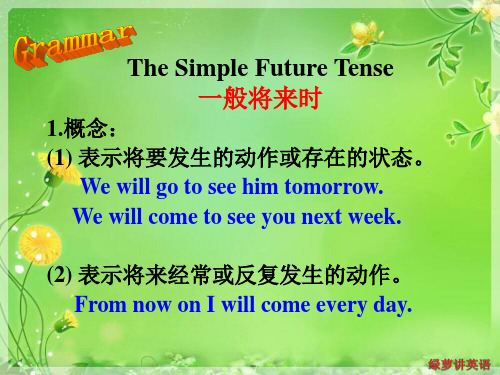初中英语一般将来时PPT课件
一般将来时课件(PPT)

2. be going to+do可表示事先计划的意图,而 will 则表示说话人当时决定的意图;
We're going to drive you home after the meeting. Don't call a taxi. We'll drive you home.
I feel ill now, and I'll go to see the doctor. I'm going to see the some meat in the fridge soon. (变一般疑问句) W __i_ll he _f_in_d _a_n_y_ meat in the fridge?
3.She will stay there in a week. (对划线部分提问) __H_o_w _s_o_on_ w_i_ll__ she _s_t_a_y_ there?
①
②
③
① Who will have an English party next week ?
② What will they have next week ?
③ When will they have an English party?
2. be going to 表将来
will 和be going to 的区别
school late. Tomorrow he _w_il_l _get (get) up very early, so he _w_o_n’t be (not be) late for school tomorrow.
1.Lucy will do her homework at home soon. (改否定句) Lucy _w_o_n’_t_d_o_ her homework at home soon.
一般将来时(20张PPT)初中英语专项复习课件

初中英语专项复习
一般将来时
构成
1.I will be 18 next year. 2.PTG will fight in a second. 3.PTG is going to fight in a second. 4.It is going to rain tomorrow.
sb. will do sb. be going to do
B 询问对方Байду номын сангаас愿
Will you marry me? Will you go shopping with me?
一般将来时
【例题】
典型例题
Susan and her sister ______ some photos in the park the day after tomorrow.
A.take
YOUR LOGO
THANK YOU
一般先斩后奏
There will be There is/are going to be There is going to be 2 exams tomorrow.
典型例题
【例题】
B There_________ a basketball match between Class
One and Class Three this afternoon.
B. taking
C√. are going to take D. takes
一般将来时
一般将来时
句型转换
He will eat KSY tomorrow. He will not eat KSY tomorrow.
一般先斩后奏
Will he eat KSY tomorrow? What will he eat tomorrow? What will he do tomorrow?
一般将来时PPT课件

一般将来时的特殊用法和例句
Be going to结构
介绍be going to结构在一般将来时中的特殊用法。
表计划和打算
举例说明一般将来时推测的语境和例句。
一般将来时常见错误和建议
常见错误 建议
解释常见的一般将来时错误用法。
提供一些建议和技巧,帮助学习者正确运用一般 将来时。
标志词
列举一般将来时常用的标志词和词组。
一般将来时的肯定句
1
主语
介绍一般将来时肯定句的主语使用方法。
2
助动词
解释一般将来时肯定句中的助动词的用法。
3
动词
说明一般将来时肯定句中动词的形式和变化。
一般将来时的否定句和疑问句
否定句
描述一般将来时否定句的构成和特点。
疑问句
阐述一般将来时疑问句的组成和提问方式。
一般将来时PPT课件
本PPT介绍一般将来时的定义、用法、结构、标志词,以及肯定句、否定句、 疑问句的构成方法。同时包括特殊用法、常见错误和建议,最后总结要点。
一般将来时的定义和用法
定义
介绍一般将来时在英语中的含义和用法。
用法
解释一般将来时的常见应用场景和意义。
一般将来时的结构和标志词
句子结构
展示一般将来时的句子结构和基本构成要素。
总结和要点
1 总结
总结一般将来时的核心概念和用法要点。
2 注意事项
提醒学习者注意一般将来时使用中的常见错 误和问题。
一般将来时PPT课件

•一般将来时基本概念•一般将来时结构与用法•一般将来时时间状语及标志词•一般将来时与其他时态对比•一般将来时在各类从句中运用•一般将来时误区及注意事项•总结回顾与拓展延伸目录01一般将来时基本概念定义与特点定义特点表现形式will + 动词原形be going to + 动词原形现在进行时表示将来预测未来计划与安排条件与假设030201使用场景02一般将来时结构与用法主语+ be not going to + 动词原形+ 其他成分主语+ be to not (非标准用法,尽量避免使用) + 动词原形+ 其他成分主语+ will not (won't) + 动词原形+ 其他成分Will + 主语+ 动词原形+ 其他成分?Be + 主语+ going to + 动词原形+ 其他成分?Be + 主语+ to + 动词原形+其他成分?(较少使用,多用于书面语)特殊疑问词动词原形特殊疑问词going to +成分?特殊疑问词to +(较少使用,多用于书面语)注意:在一般将来时的使用中,要注意区分不同语境和表达方式的细微差别,选择合适的结构进行表达。
同时,也要注意与其他时态的区分和联系,避免混淆使用。
特殊疑问句结构03一般将来时时间状语及标志词常见时间状语表示将来的时间状语表示计划或安排的时间状语标志词识别与运用04一般将来时与其他时态对比与现在进行时对比时间指向不同01动词形式差异02使用情境不同03时间基准差异动词形式变化使用情境区别时间范围不同动词形式区别使用情境差异05一般将来时在各类从句中运用在宾语从句中运用01 02定语从句的时态取决于它所修饰的先行词,如果先行词是将来时态,定语从句也使用将来时态。
如果先行词是过去将来时,定语从句则使用过去将来时。
定语从句中表示将来的时间状语有:tomorrow, next year, in the future 等。
06一般将来时误区及注意事项误区二过度使用“will”和“going to”。
一般将来时课件ppt(共17张PPT)

Jim going to
afternoon?
in the playground tomorrow
4. .Jim is going to play football in the playground tomorrow afternoon.
Jim going to play football tomorrow afternoon?
2)在浊辅音和元音后读/d/.
一般过去时, 要用动词过去式. Jim is going to play football in the playground tomorrow afternoon.
Jim is going to play football in the playground tomorrow afternoon. ⑵are变为were。
there were many beautiful flowers there. 一般将来时表示将来某个时间要发生的动作或存在的状态常与表示将来的时间状语连用
⑴am ,is变为was。
So she They to read some books.
What did they do in the park? 1)在清辅音后读/t/ .
(3).动词过去式变化规则
a)一般情况下,直接加ed.如:wash--washed, look---looked; b)以不发音字母e结尾的,加d.如:like---
liked, dance---danced; c)以“辅音字母+y”结尾的,变y为i再加ed. 如:study---studied;
food and (play) lots of games. They
(come) home at 4:30.
一般将来时PPT课件

一、单项选择
(C) 1. There __________ a meeting tomorrow afternoon.
A. will be going to B. will going to be C. is going to
shall常用于第一人称. shall
否定式:shall not = shan’t
will常用于第二、三人称,但在 will 口语中各种人称都可以用will.
否定式:will not = won’t
四、现_在___进__行___时态 + 表示将来的时 间状语也可以表示将来。
五、There be 句型的一般将来时态 的结构:there +is_g_o_in_g_to_ + be + 名词或there + will+ be + 名词。
begoingto表示根据主观判断将来肯定发生的事情表示根据主观判断将来肯定发生的事情will表示客观上将来势必发生的事情
The Simple Future Tense
一、一般将来时表示将来某一 时刻的动作,状态以及打算。 该时态一般与表示将来意义 的时间状语连用。如:
tomorrow, this month, the day
next week.
A. will be; is
B. is; is C. will be; will be D.
is; will be
(D) 4. There ________ a dolphin show in the zoo
tomorrow evening.
A. was B. is going to have C. will have D. is going
初中英语一般将来时will和be going to讲解课件

going to, 而多用will。 如:
If any beasts comes at you, I'll stay with you and help you.
1.Bob and I _w__il_l_m__a_tc_h__(watch) an action movie tomorrow.
2.We __w__il_l _b_e____(be) able to go to space in the future.
时间状语:
tomorrow 明天
next week 下周
next month 下个月 next year 明天
before不久
soon 不久
the day after tomorrow 后天
the year after next 后年
the week after next 下下周
基本句型: 肯定句: 主语 + will +v. 原形 否定句: 主语 + will +not + v.原形 一般疑问句: will +主语 + v.原形
3.The childrenw_i_ll_d_i_s_cu__ss__(discuss) the plan after school.
He is seriously ill. He is going to die. He will be twenty years old.
2024年中考英语语法复习—一般将来时课件

2)用在由when,if等引导的时间状语从句和 条件状语从句中,表示将来的动作。
If it doesn’t rain tomorrow,we will go hiking. 如果明天不下雨,我们将去远足。
★一般将来时经常会伴随一些时间状语,比较常见的有:
tomorrow
soon
next week下周
练习
1 . There ________ a sports meet next week if it
________.
A.is going to have; doesn’t rain
B.is going to be; doesn’t rain
C.is going to be; won’t rain D.is going to have; won’t rain
Will you go there? 你要去那儿吗?
“Shall I...?”“Shall we...?”常用来征求对方意见。“Will you...?”表示客气的邀请或请求。
Will you please open the window? 请你把窗打开,好吗?
3.否定句:在will/shall后加not,可缩写成 won’t/shan’t 陈述句:I will go there./I shall go there. 我要去那儿。
to +
+其他
not,即主语+be not going
I am not going to watch the video. 我不准备去看录像。
3)一般疑问句:将be
Is he going to see a doctor? 他准备去看医生吗?
4)含有be goi to+动词原形+其他
